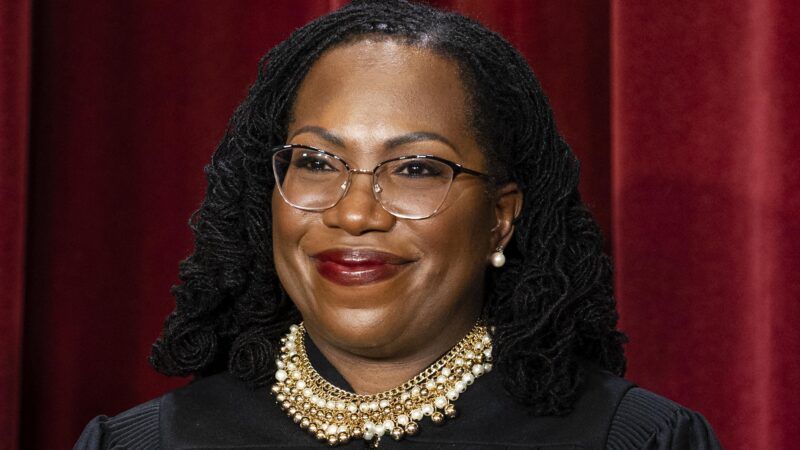'Hamstringing the Government': A Viral Narrative Distorts Ketanji Brown Jackson's Understanding of Free Speech
If partisans have one thing in common, it's confirmation bias.

"My biggest concern," said Supreme Court Justice Ketanji Brown Jackson on Monday, "is that your view has the First Amendment hamstringing the government in significant ways."
That comment came during oral arguments in Murthy v. Missouri, the case that asks if President Joe Biden's administration violated the First Amendment when it sought to pressure social media apps to remove information it deemed harmful. It took almost no time for Jackson's tidbit to set off the viral narrative that she doesn't grasp basic constitutional principles, particularly when considering the point of the First Amendment is indeed to hamstring what the government can do in response to speech it may not like.
"Jackson raises eyebrows with comment that First Amendment 'hamstrings' government," wrote Fox News. "Leftists want unlimited government — which is why they hate the Constitution," lamented The Federalist. It was "literally one of the craziest things I've ever seen," said Rep. Jim Jordan (R–Ohio).
But like so many viral narratives, Jackson's comments were fairly benign in context, and were actually echoed by Justices Brett Kavanaugh and Amy Coney Barrett. Perhaps most ironically, her remark spoke fundamentally to the crux of the case: The government, of course, does not have the right to punish someone criminally for the vast majority of speech. But does it have the right to persuade?
Jackson may think it does. Her "hamstringing" comment came attached to a hypothetical scenario she posed to Benjamin Aguiñaga, Louisiana's solicitor general, who argued the Biden administration had overstepped when it contacted social media platforms and attempted to pressure them to remove posts it found objectionable. Suppose a challenge circulated on social media concerning "teens jumping out of windows at increasing elevations," Jackson said. Could the government try to persuade those platforms to remove that content?
No, Aguiñaga said, because that's still protected speech, no matter how dangerous.
That might very well be the correct interpretation. But Jackson's take—that such a view could place too much restraint on the government—is one that's held by many, including, it appears, some of her more conservative colleagues. Kavanaugh, for example, invoked his experience working with government press staff, who regularly call reporters to criticize them and try to influence their coverage. Would it be illegal for the feds to prosecute those journalists for pieces that cast them in a negative light? Absolutely. Is it beyond the pale for the government to express what it believes to be true in seeking better coverage? Not necessarily, Kavanaugh said.
That doesn't mean they're correct. But the great irony of the viral Jackson pile-on is that, based on oral arguments, her view may very well prevail.
Jackson, of course, is not the first to find herself in this situation. At a recent rally in Ohio, former President Donald Trump said there would be a "bloodbath" if he were to lose. The comment set off a media frenzy, despite that, once again, the comment, which seemed to refer to the auto industry, appeared far more benign in context. But if partisans have one thing in common, it's confirmation bias. They often differ on which ideas they want to succeed, but they want their side confirmed just the same—sometimes at the expense of truth.


Show Comments (142)